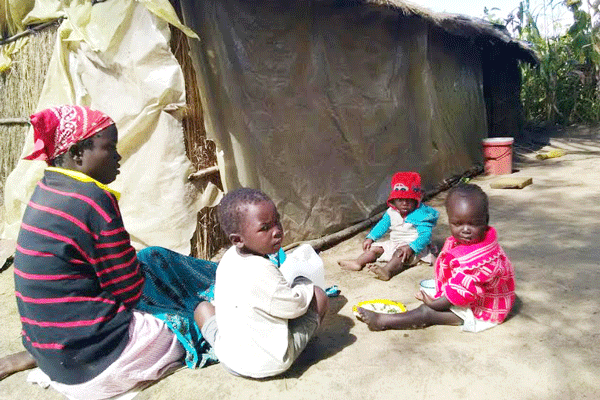
By Amanda Ncube
SIXTY-TWO-year-old widow Sibonokuhle Nkomo from Manama village in Gwanda has no idea what she will feed her two granddaughters for their next meal.
She nervously goes through her cupboards and pots over and over again with the hope of finding some leftovers, which she could have possibly missed, but she still finds nothing.
Her three children, who are based in South Africa, have been her main source of hope as they have been sending her groceries and money monthly.
Due to the Covid-19 pandemic, all her children have not been working for the past four months.
“One of my daughters was working at a salon in Cape Town and she was retrenched in April because of the pandemic,” Nkomo said.
“My other two children work in restaurants in Cape Town, but because of the lockdown in the neighbouring country their workplaces have remained closed for the past four months.”
While the restaurants where her two children work are set to reopen soon, the staff will be working twice a week, which means Nkomo’s problems are far from ending.
- Chamisa under fire over US$120K donation
- Mavhunga puts DeMbare into Chibuku quarterfinals
- Pension funds bet on Cabora Bassa oilfields
- Councils defy govt fire tender directive
Keep Reading
Nkomo’s children are now struggling to support their mother and their two teenagers who are under her care.
Nkomo has a small garden where she grows some vegetables, but the money she makes after selling her produce is hardly enough to sustain her family. Handouts from neighbours help here and there.
“I used to stock some food each time my children would send groceries, but we have run out of supplies,” she said.
“My granddaughters need sanitary pads and I don’t know where I will get them from.
“Each day I have sleepless nights wondering what I will feed them on the following day.
“I travel far trying to sell my vegetables, but the money is hardly enough.”
Nkomo’s daughter who was working in a salon, Memory Nkomo, moved out of a flat she was renting in South Africa and is now living with a relative.
Memory is now desperately looking for another job or means to earn a living, but it is proving difficult because of the prevailing pandemic.
She says she cannot go back home despite losing her job as she would only become a burden to her mother.
“I couldn’t afford paying rent as I lost my job and I moved in with a relative. It pains me that I can’t support my mother anymore and my child,” Memory said.
“I hope to get a job soon because life has become difficult for me. I also don’t want to be a burden to the relatives I’m staying with.”
This is the predicament that has befallen several families in Matabeleland South province that have been relying on remittances from the neighbouring countries.
According to the Zimbabwe Vulnerability Assessment Committee (ZimVac) Rural Livelihood Assessment of 2019, Matabeleland South province accounted for most of the remittances from outside Zimbabwe with 31,4% followed by Matabeleland North which accounted for 11% of the remittances.
Some parents have left their children under the care of their grandparents and have moved to the diaspora.
They have been relying on omalayitsha to send goods to their relatives back at home.
Some youngsters that drop out of school due to various reasons also flock to the neighbouring countries.
Matabeleland South provincial social welfare officer Criswell Nyakudya said the number of vulnerable households in the province had drastically increased since the outbreak of the Covid-19 pandemic.
“We have clients visiting our offices looking for assistance as their relatives in the diaspora are no longer sending them anything either because they have lost their jobs or they are failing to send groceries as the borders are closed,” Nyakudya said.
Nyakudya said the fact that Matabeleland South province fell under region 5, which is characterised by poor rains, made it difficult for villagers to rely on farming as a source of livelihood.
He said going to the diaspora was the most accessible option for many.
“People in Matabeleland don’t have many alternatives when it comes to livelihoods thus they rely on the diaspora,” Nyakudya said.
He suggested said there was need for the central government to increase the number of beneficiaries under the drought relief programme as more households had become vulnerable.
He also encouraged families to come up with alternative means of survival.
l This article was originally published by The Citizen Bulletin, a hyperlocal nonprofit news outlet covering COVID-19 in Matabeleland.











